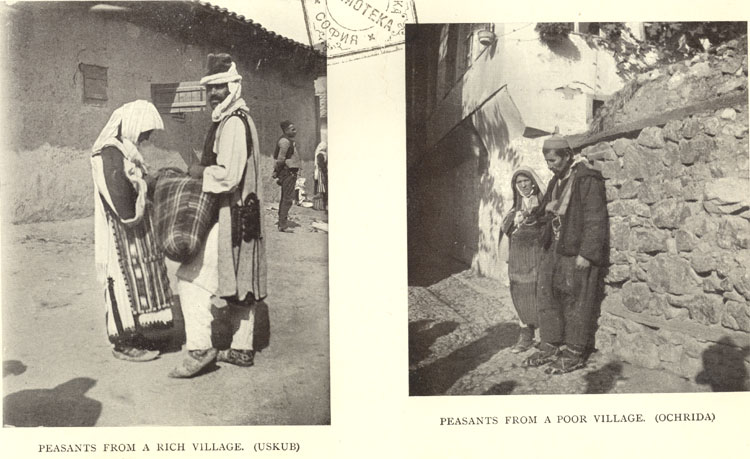II. Village life in Macedonia
4. Differences in Prosperity of Villages. Brigandage. Migratory Labour.
There are considerable local differences among Macedonian villages, and the chief factor in measuring their happiness is the character of their neighbours. A village in an isolated position, or in a district wholly peopled by
![]()

![]()
49
Christians, may enjoy comparative security, and raise itself under favourable conditions to a certain rude affluence. The proximity of a village where the Turks are fanatical at once depresses its whole standard of living. The worst case of all is that of the Slavonic population, which borders on the Albanian country — from Old Servia in the north down to the glens of Kitchevo and Ochrida, which are exposed to the continual raiding of the clansmen of Dibra. In some of these valleys the Albanian invasion is an annual event, in others it is chronic. Cattle are lifted, crops of corn or hay are carried away before they can be garnered. There are seasons when it is impossible to cut wood on the hillside, or, indeed, to venture outside the precincts of the village. There are four villages in an abandoned glen to the west of Kitchevo which reckon on four or five visitations every year. In 1903 they were looted and burned to the ground, but as the Albanians during the license of the insurrection went further afield and raided afterwards in richer districts, we found these villages fairly contented. As they had had their customary punishment early in the season and got it over quickly, they considered that on the whole they had passed a nice quiet year. Perhaps the worst scourge of these regions is the Albanian pastime of kidnapping, to which the tribes of Dibra are specially addicted. The method is to capture stragglers, usually a solitary lad or an old man who is surprised cutting wood or herding sheep at a distance from the village. He is carried off to Dibra and kept there until his ransom is paid. An enterprising bey will sometimes have several of these captives at once in his tower. They are sometimes fettered and driven out at sunrise with the cattle to labour in the fields till evening. I knew one family in the Malesia (Ochrida) region to which this catastrophe had happened thrice within the memory of a young man who cannot have been more than thirty years of age. I knew another case in which the ransom demanded for a young boy was as much as £T100 (about £93). His family were no more than peasants, though of the wealthier class. Half the money was found by selling their flocks and their land, the other half was provided by
![]()
50
the elder brother, who earned it by leaving his wife and children and working for five years in Constantinople. Indeed, these exactions are a constant cause of migration, and the Malesia villages only maintain themselves by sending their more enterprising members to labour in Austria.
If the villages on the marches of Albania are constantly on the edge of famine and extermination, the southern country of the Monastir vilayet (province) is relatively prosperous. Their Albanian neighbours belong to the milder Tosk race. There are few estates (tchifliks), and most of the villages own their own lands. But agriculture is comparatively unimportant. The peasantry has abandoned the struggle with the tax-collector and with nature, and lives by migratory labour. Each village has its own characteristic trade. One goes to work in market-gardens near Constantinople, and hawks their produce. Others have a monopoly of what we would call the dairy business, and grow rich by selling kaimak (a sort of sweet junket). A third has a reputation for its carpenters, and a fourth for its masons, and these wander all over the Levant, building wherever there is a demand. One little village has a traditional connection with the building trade of Athens, and nearly half of its families own houses in the Greek capital, which they have built with their own hands, and from which they draw a comfortable rent. Other districts prefer to work in Bulgaria or in Roumania. The less thrifty are content with an absence of a year or two, at the end of which they return with savings that range from £15 to £30 — an appreciable capital in this primitive country. The richest village that I came across, Smerdesh, now a mere heap of charred ruins, boasted that it reached this pre-eminence because its young men are enterprising enough to spend as much as seven continuous years abroad, at the end of which they will return with no less than £200 or £300 in hand. The result is that these villages bear little resemblance to the miserable agricultural hamlets of the country round Ochrida or Uskub. The houses are large and comparatively well built. Each village boasts a thriving school and three
![]()
![]()
51
or four shops, while their churches are large and almost ostentatious.
These communities form an interesting exception to the general poverty,
but it is none the less an exception which proves that the only way to
thrive in Macedonia is to leave it.
[Previous] [Next]
[Back to Index]